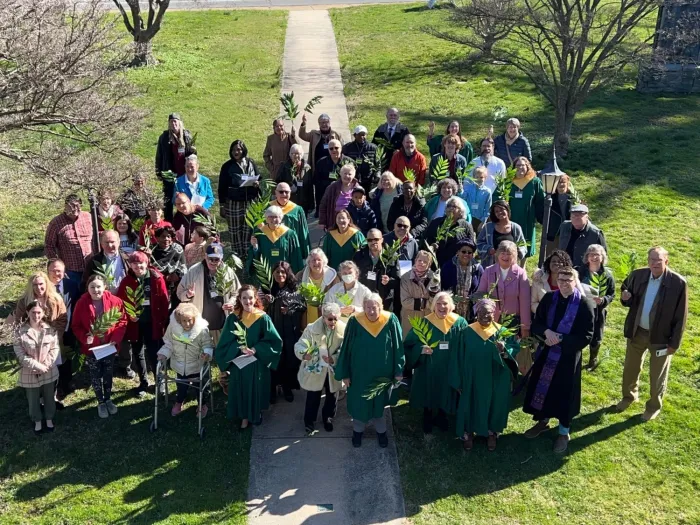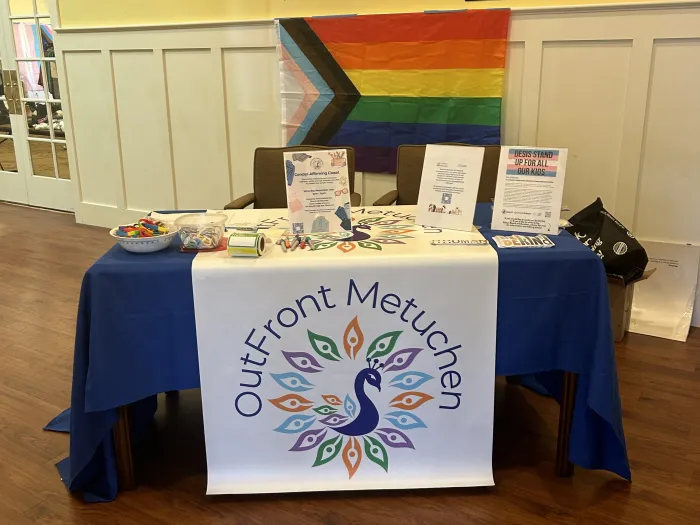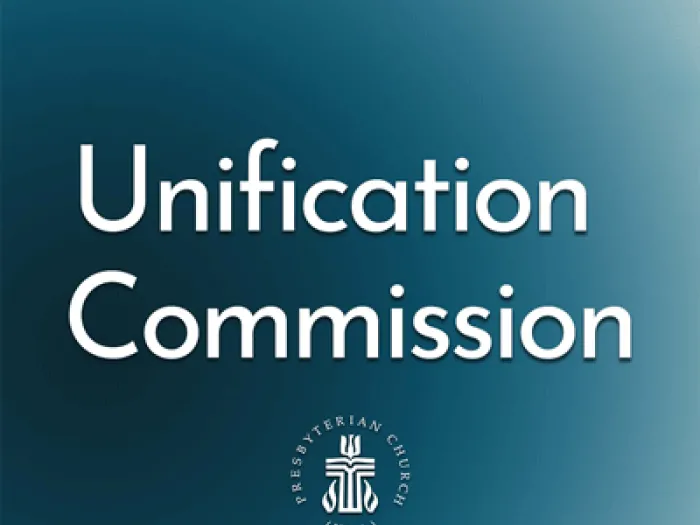New PC(USA) mission network begins work in earnest
Historic meeting with regional partners only a first step to addressing migration issues in Mesoamerica

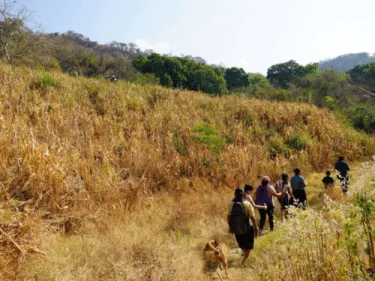
LOUISVILLE — Following up on their historical meeting in March, which brought together a large group of diverse church partners and groups, the Mesoamerica Mission Network (La Red de Misión y Migración en Mesoamérica), previously referred to as the Central America Mission Network, now turns its attention to the day-to-day work required for building an intercultural solidarity network around migration issues and justice. In all, representatives from 60 different organizations with relationship to Central America gathered in El Salvador for eight days to be in community with one another, brainstorm ideas, reflect, learn, and strategize on how to best advocate for migrants in the region.
The network’s goal is not to end migration — which they believe is a human right — but to transform it into something that reflects the reign of God.
“Migration is a part of humanity, and it is a human right both to migrate and not to migrate. Our community does not look to eradicate or eliminate migration, but to transform migration into something that reflects the reign of God,” said Joseph Russ, PC(USA)’s mission co-worker based in El Salvador.
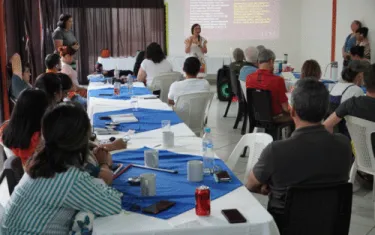
Russ has been collaborating with the Calvinist Reformed Church of El Salvador (IRCES) the last two years helping to organize stakeholders and lead the discernment process for forming the new network. PC(USA) representation at the meeting included personnel from the Office of the General Assembly, World Mission, Presbyterian Disaster Assistance, Presbyterian Hunger Program, Presbyterian Peacemaking Program, Ministry Engagement and Support, Presbyterian Borderlands Ministry and the Young Adult Volunteer program.
“Many present were migrants themselves. We celebrated the beauty of their migration stories, while also lamenting the pain and difficulties associated with migration,” said Russ. “We seek to build a system of migration that respects and guarantees human rights, strengthens the spiritual and religious communities that can equip people with tools and spiritual resources to remain in their communities of origin or can support migrants with shelter and aid in their journey and receive them with love and compassion in countries of destination or return. It means not only providing support as the church, but also advocating for changing policies around economics, international relations, and migration to better reflect our values of love, hospitality, and care throughout the region.”
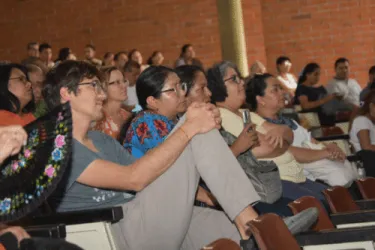
The week-long session included visits to small, rural villages; a private school run by the Reformed Calvinist Church in a densely populated urban area; historical sites; and meetings with local migrant pastoral staff and community leadership. The group also received visits from a variety of organizations, including the human rights non-government organization (NGO) Cristosal, and the Lutheran Synod’s migrant ministry. Taken together, the agenda provided a comprehensive and nuanced view of the situation in El Salvador and, more broadly, in Central America, according to Russ. The meeting culminated with strategic planning sessions, which identified proposed action steps to be taken that favor migrants.
Russ noted that nearly every group represented at the initial meeting shared a devotional in the morning or reflection in the evening, bringing something from their own experience and traditions to the group. One woman shared her migration story from Mexico of the shawl she received as a gift before leaving to hold her and keep her safe for the journey: each participant donned shawls to share with one another. Two people from Southern California shared a prayer and an African American spiritual, calling participants to “not be silent anymore.”
“Together, we rooted our work in our faith and spiritual traditions and developed theological language to speak about and reflect on migration,” said Russ. “The most important part of the in-person network launch was building together an intercultural community of solidarity and resistance. Coming together from so many different organizations, churches, presbyteries, backgrounds, and countries was challenging, but we were able to strengthen connections and commitments, and develop the roots to sustain this work going forward.”
Among the regional partners who attended were:
- The Reformed Calvinist Church of El Salvador
- CEDEPCA
- Frontera de Cristo
- The Presbyterian Evangelical Mission of Honduras
- Pop No’j
- Beth-el Farmworker Ministry
- Southern California Immigration Task Force
Partner perspectives
One of the partner participants, Dr. Terisita Matos-Post, executive director for Beth-el Farmworker Ministry in Tampa, Florida, penned a reflection on the role of Christian women in ministry migration. In it, she touched on numerous topics of conversation at the El Salvador meeting — one being the church’s silence on migration.
Matos-Post quoted one Christian leader in Honduras who noted that “migration is a sensitive topic within the church community. Migrating for economic benefit is seen as good, but if someone is forced to leave due to a threat to their life, they may be judged unfairly by the church."
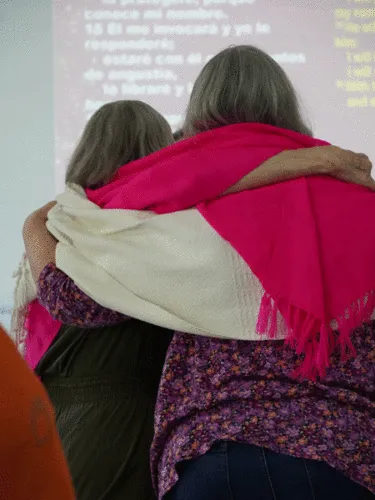
Another leader from Mexico, who coordinates migrant services at the border said, “Churches often lack understanding about migration. This is because they do not work, preach, or talk about it. As a result, the Church has no idea until it becomes involved and awakened towards this community that is moving through diverse situations."
(More from Matos-Post will be published soon by Presbyterian News Service.)
Russ is emphatic about the role of the church when it comes to migration justice.
“The church has a prophetic word and a special role in addressing migration that complements the work of other NGOs, advocacy groups and governments while addressing the specifically religious, spiritual, and theological dimensions of migration. Migration is not just an economic or social decision, but a spiritual and religious one. The church is in a unique position to provide spiritual guidance in taking the decision to migrate, in providing pastoral accompaniment for migrants in transit, destination or return, and in developing a theology of migration which informs the church’s work. While an international treaty can demand we respect the rights of our migrant neighbor, only the church can call on us to love our neighbor as ourselves, whether it’s our neighbor in another country or our neighbor next door. The vision of the church goes beyond just respecting rights, but to truly and faithfully loving our neighbor.”
What’s next?
Immediate next steps include gathering the leadership team to develop local, regional, and international plans for advocacy and intercultural education. The network will be looking at the needs identified during their time together and finding ways to meet those needs. A variety of goals and objectives ranging from concrete changes to public policy to changing public opinion around migration were pitched during the conference’s final days. Some actions proposed included writing letters to government officials and providing training related to migration for pastoral leadership in responding to the needs of their congregations. While resources are not currently available, the network is collaborating with Pittsburgh Theological Seminary to develop a training program for leadership around intercultural work, migration and theology, and mobilization for advocacy.
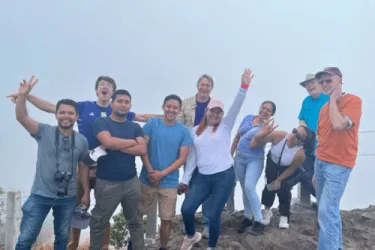
Anyone interested in joining the network, or supporting its work, can reach out directly to Joseph Russ, the Coordinator for Migration Issues, Advocacy, and Mission in the Northern Triangle of Central America at Joseph.Russ@pcusa.org.
Once the gathering had concluded, Kathy Wells, meeting participant from Carlisle Presbytery and the Honduras Mission Network, summed up her thoughts in a recent blog post.
“And now … it is time for us to think about our own journey. How will we walk with the migrants who are our sisters and brothers? What can we do to ease their burdens? How can we help make life easier for them in their own countries, so they do not feel a need to migrate? The work ahead of us now is the most difficult of all.”
You may freely reuse and distribute this article in its entirety for non-commercial purposes in any medium. Please include author attribution, photography credits, and a link to the original article. This work is licensed under a Creative Commons Attribution-NonCommercial-NoDeratives 4.0 International License.


